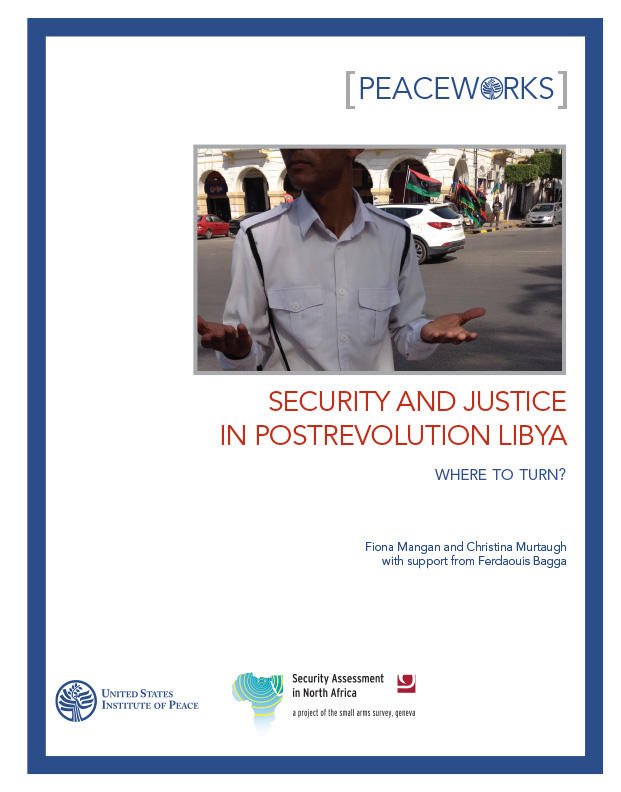Where to Turn?
Three years after the death of Muammar Qaddafi and the end of the revolution in Libya, security and justice are stalled and elusive despite the proliferation of security providers. The power of the gun prevails over the rule of law. Many see no end in sight. Based on a nationwide survey and drawn from interviews and focus group sessions, this report—supported by the USIP and the Small Arms Survey—tracks security and justice in Libya from before the revolution through today, its realities, and its impact on the country and its population.
Summary
- Three years after the revolution, rule of law in Libya remains elusive.
- During Qaddafi’s forty-two-year rule, the primary forms of state security and justice—police and army, regular courts and prosecutors—were deliberately and systematically weakened as real power was diverted to the regime.
- In the wake of the revolution, people rejected formal systems and turned instead to their communities, finding security in revolutionary ketibas and justice through tribal leaders, wise men, and religious leaders.
- The current web of security is a mix of old and new, creating confusion and feeding feelings of uncertainty.
- Initially Libya’s saviors, the revolutionary thuwar are now held largely in disfavor. The plan to integrate them into the state security system has had limited success.
- The presence of weapons, the vast majority of which are beyond state control, and frequent unpredictable acts of violence compound the lack of security.
- The justice system has not been able to resume normal levels of functionality. Nonstate dispute mechanisms have emerged to fill the void, but rely more on the relative power of the disputing parties than on the law and have not proved effective.
- Self-help and vigilante justice are thus on the rise but also fail to meet citizens’ needs.
- Libyans continue to look to the state—through the police, the army, and the judiciary—to be the sole provider of security and justice.
- Both the Libyan government and local communities need to reframe their reform efforts. Certain recommendations are key to that effort: a national vision, security for civilians and justice sector actors, dialogue to build trust, and engagement with rather than around formal institutions.
About the Report
This report maps the evolution of Libya’s weak security and justice sector from the Qaddafi era through the 2011 revolution to today. Supported by the United States Institute of Peace (USIP) and the Small Arms Survey, and drawn from interviews, focus groups, and a nationwide household survey, the report analyzes the realities of the security and justice sector and their impact on ordinary Libyans. For more on Small Arms Survey's publication on perceptions around security, justice and weapons, see their report Searching for Stability.
About the Authors
Fiona Mangan is a senior program officer with USIP’s Governance Law and Society Center and facilitator for the International Network to Promote the Rule of Law. Her work focuses on prison reform, organized crime, and justice and security issues, primarily in Libya. She previously worked at the Stimson Center, the Irish Department of Justice, Independent Diplomat in New York, Lawyers Without Borders in Liberia, and the International Stability Operations Association in Washington. Mangan has also served as an international election observer for the Carter Center in South Sudan and for Progressio in Somaliland. Christina Murtaugh is a senior program officer at USIP’s Rule of Law Center. Her focus is on the Justice and Security Dialogue Program; the International Network to Promote the Rule of Law, a community of practice initiated by the Rule of Law Center in 2007; and field-based empirical research on rule of law in Libya.
